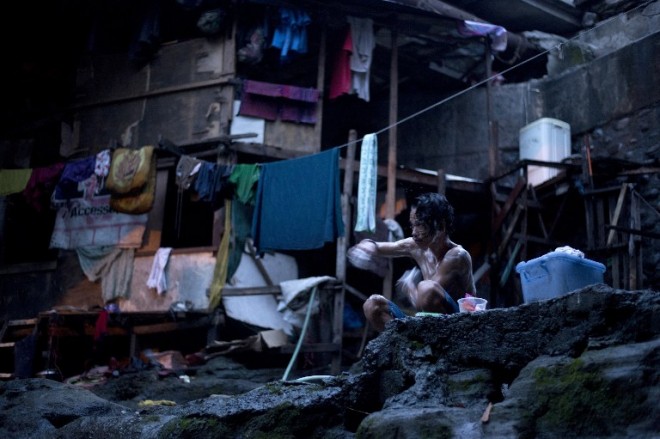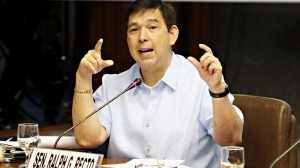Millions in PH don’t have access to clean water, toilets—report
Seven-and-a-half million Filipinos have no toilets while 8.4 million have no access to clean drinking water, Senator Ralph Recto said on Friday, citing a joint report by the World Health Organization (WHO) and the United Nations.
Recto said buried in the pages of “Progress on Sanitation and Drinking Water: 2015 Update and MDG Assessment” are the findings that 7.1 million Filipinos resort to “open defecation” while 570,000 use “unimproved sanitation facilities” like buckets and open-pit latrines.
The report, which was released Wednesday, described “open defecation “as when human feces are disposed of in fields, forest, bushes, bodies of water or other open spaces.”
READ: 90 percent of Filipino households don’t practice proper toilet hygiene, sanitation
The report also showed that 2.3 million Filipinos use untreated “surface water” from rivers, dams and canals for drinking while 6.1 million source their drinking water from “unimproved drinking water sources” like unprotected dug wells and unprotected springs.
Article continues after this advertisementREAD: Lack of sanitation, clean water killing kids, says Unicef
Article continues after this advertisementRecto said the report, which tracks access to drinking water and sanitation against the Millennium Development Goals (MDG), should prompt the government to increase investments for clean water and sanitation.
“This should be part of the assumption of the 2016 budget,” the senator said in a statement.
Malacañang is expected to submit to Congress by the end of the month its proposed budget next year, which is to breach P3 trillion.
In the annex of the WHO-Unicef report was the scorecard on how countries have progressed in bringing clean water and sanitation to their citizens, the senator said.
“To our credit, we have made great progress on these two items,” Recto said. “We have brought clean water to 40 million people since 1990 and 41 million Filipinos have also gained access to clean toilets since that year.”
This, he said, prompted WHO and Unicef to rate the Philippines as having “met target” MDG goals on clean water.
But on sanitation facilities, the Philippines was graded as having merely made good progress, “due perhaps to the number of people resorting to “open defecation,” the senator said.
“Mas mataas pa ang family cellphone ownership rate sa bansang ito kesa toilet per household,” he added.
To wipe out the backlog of homes needing piped water, Recto called “for the opening of the budget taps for clean water and sanitation projects.”
Among the ongoing projects which he said should get more funds next year is the construction of toilets and communal drinking faucets in public schools, a component of Basic Educational Facilities program of the Department of Education this year.
“To truly gauge how much we are spending for clean water, I think we should identify in the national budget the amounts for clean water because at present, it is lumped together with flood control,” he said.
For this year, he said, P39 billion is said to be spent for water resources development and flood control.
Recto said the national government should also engage in a “joint venture” with local governments in building public bathrooms and toilets to which the urban homeless can go.
He said another initiative worth pursuing is to tap travel tax collections in constructing either free or pay-per-use restrooms along our highways.
To lower the cost of sanitary toilets, the senator said the Department of Science and Technology can design an affordable, easy-to-produce package.
Recto said clean water projects must be pursued “because water-borne diseases cost Filipinos P2.8 billion annually in treatment costs and lost economic opportunities.”
“Handwashing cuts by one-third to one-half the number of diarrhea cases. If we use the number of people diarrhea downed in 2010, which was 269,000, imagine how many cases will be avoided and lives saved if we can bring more clean piped water to homes,” he further said. IDL

